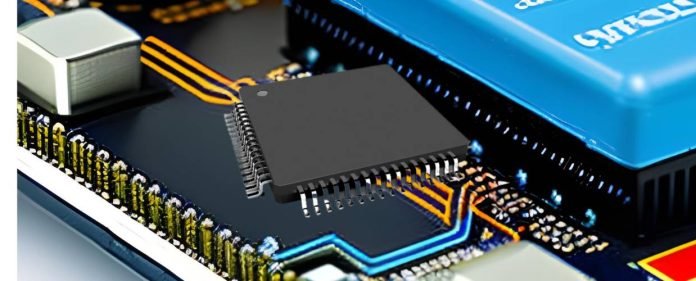In a world where technology permeates every aspect of our lives, the microcontroller stands as a silent hero, orchestrating the functionality of a vast array of devices that have become indispensable to our daily routines. This comprehensive exploration embarks on a captivating journey into the realm of microcontrollers, peeling back the layers to reveal their core, delving into the diverse applications that span industries, unraveling their transformative impacts on society, and addressing the intricate complexities that underlie their remarkable capabilities.
Decoding the Core Essence of Microcontrollers
Beneath the sleek exteriors of our electronic devices lies the microcontroller—a minuscule but potent integrated circuit at the heart of modern innovation. These remarkable components embody a fusion of processing power, memory, input/output interfaces, and analog-to-digital converters within a compact package. Microcontrollers are meticulously designed for specialized functions, unlike their larger counterparts, like microprocessors, which handle general-purpose computing tasks. They are akin to the conductor of an orchestra, seamlessly coordinating various operations to bring devices to life, whether it’s a digital alarm clock or a sophisticated medical device.
Diverse Applications Spanning Industries
Microcontrollers are the unsung heroes that traverse industries, propelling advancements and enabling innovations in countless domains.
Consumer Electronics
From the blinking LED on a remote control to the intricate display on a smart refrigerator, it powers a myriad of consumer electronics. These tiny yet mighty components manage power consumption, process user inputs, and orchestrate the seamless interactions that define the modern user experience.
Automotive Innovation
The automotive industry owes a significant debt to microcontrollers for its innovation. These controllers govern critical functions, including engine management, anti-lock braking systems, and airbag deployment. Microcontrollers contribute to enhanced performance, fuel efficiency, and passenger safety by efficiently regulating these operations.
Healthcare and Medical Devices
Healthcare is deeply intertwined with microcontrollers, which are pivotal in medical devices such as heart rate monitors, insulin pumps, and diagnostic equipment. These components ensure accurate data acquisition, real-time monitoring, and precise control, ultimately shaping the landscape of patient care and medical advancements.
Industrial Automation
The manufacturing landscape owes its efficiency and precision to microcontrollers, which power the automation and control of industrial processes. Programmable logic controllers (PLCs) and supervisory control and data acquisition (SCADA) systems, driven by it, orchestrate intricate manufacturing operations, optimizing production lines and driving operational excellence.
Internet of Things (IoT)
The IoT revolution thrives on microcontrollers, enablers of connectivity and intelligence. Embedded within smart devices, these controllers facilitate communication, data exchange, and automation, forming the backbone of an interconnected world where devices seamlessly interact to enrich our lives.
Transformative Impacts on Modern Society
It wield a transformative influence on society and industries, altering the fabric of technology and redefining the boundaries of innovation.
Efficiency and Precision
Microcontrollers epitomize efficiency and precision, driving optimization across sectors. With real-time capabilities, these controllers execute tasks with minimal delay, ensuring accurate data processing, control, and decision-making. This efficiency translates into reduced errors, lower waste, and heightened resource utilization.
Technological Advancement
Microcontrollers propel technological advancement by enabling the development of cutting-edge devices and systems. From autonomous robots to smart appliances, these controllers serve as the bedrock upon which innovation flourishes, sparking new realms of exploration and reshaping the future.
Enhanced User Experience
Microcontrollers revolutionize user experiences by delivering intuitive interfaces, seamless controls, and responsive interactions. Devices featuring touchscreens, voice recognition, and gesture controls owe their user-friendliness to the capabilities of microcontrollers, bridging the gap between human intent and machine action.
Sustainable Development
The intrinsic efficiency of microcontrollers aligns seamlessly with sustainable development goals. By optimizing processes, minimizing energy consumption, and streamlining operations, these components contribute to reduced environmental impact, echoing the principles of conservation and responsible resource utilization.
Challenges and Considerations
However, the journey of microcontrollers is not without its challenges.
Design Complexity
The design of microcontroller-based systems is a multidimensional endeavor, requiring expertise in electronics, software development, and domain-specific knowledge. Ensuring seamless integration, compatibility, and optimal performance demands meticulous planning and cross-disciplinary collaboration.
Power Management
Microcontrollers operate within the confines of energy constraints, necessitating careful power management strategies to strike a balance between computational demands and energy efficiency. Efficient power usage is essential to extend battery life, reduce environmental impact, and ensure optimal device performance.
Security Concerns
As microcontrollers become integral to interconnected systems, security vulnerabilities loom large. Protecting against cyber threats, unauthorized access, and data breaches is of paramount importance to safeguard sensitive information, privacy, and the integrity of connected devices.
Lifecycle Management
Like all technological components, microcontrollers have lifecycles that impact their long-term viability and support. Ensuring the availability of replacement parts, updates, and maintenance is critical, particularly in sectors reliant on these controllers for mission-critical functions.
Conclusion Architects of Technological Evolution
Despite their unassuming size, microcontrollers are the architects of the technological evolution that defines our era. They bridge the gap between imagination and reality, converting concepts into tangible innovations that shape the modern world. As we navigate the complexities of an increasingly interconnected and digitized society, the role of microcontrollers becomes ever more pronounced. Through strategic design, relentless innovation, and proactive consideration of challenges, we harness the potential of microcontrollers to forge a path toward a future where automation, connectivity, and innovation harmonize to create a tapestry of unparalleled possibilities.



